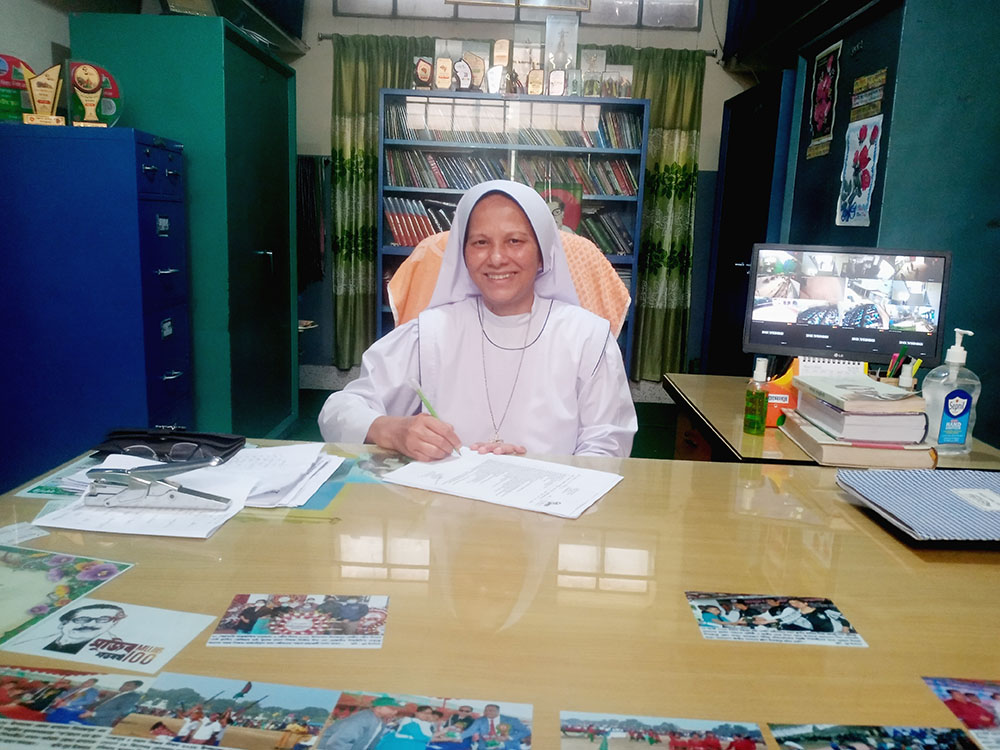
Shanti Rani Sr. Pierina Cecilia Das, headmaster of St. Francis Xavier High School, Balubari, in Dinajpur, northern Bangladesh (Sumon Corraya)
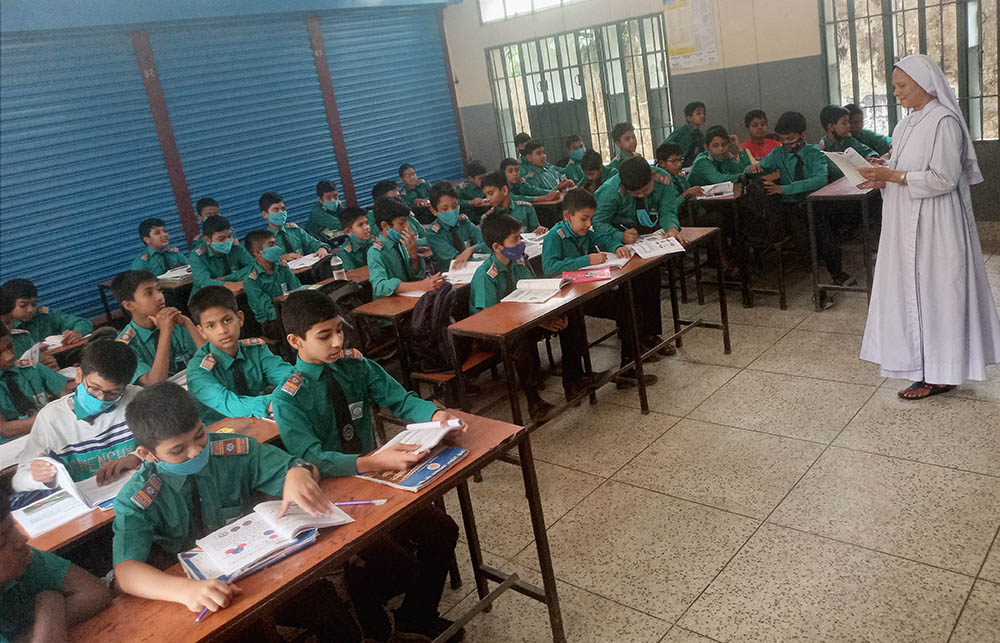
Shanti Rani Sr. Pierina Cecilia Das teaches students at St. Francis Xavier High School in Balubari, Dinajpur, Bangladesh. (Sumon Corraya)
Iqbalur Rahim, a member of the Parliament of Bangladesh and former student of St. Francis Xavier High School, Balubari, in Dinajpur, northern Bangladesh, has donated 90 million taka (US$981,000) for a new building for the school. The school is run by the Catechist Sisters of the Immaculate Heart of Mary, Queen of Angels, popularly known as the Shanti Rani Sisters.
On March 14, Rahim, Education Minister Dipu Moni and Bishop Sebastian Tudu of Dinajpur inaugurated the new school building. In addition to Rahim, many other public figures in Bangladesh are former students of the school, including M. Enayetur Rahim, a justice on the Appellate Division of Bangladesh Supreme Court.
The school opened July 23, 1962, with five lower-class Hindu students. Now, it has 1,250 students from different levels of society, and only 15 students are Christian. Parents who once studied in the school now send their children there.
In this Muslim-majority country of 165 million people, where Christians make up less than 1% of the population, it is not easy for nuns to run an educational institute. Recently, GSR spoke with St. Francis Xavier High School's headmaster, Sr. Pierina Cecilia Das.
GSR: What are the aims and objectives of St. Francis Xavier High School?
Das: We provide quality education regardless of race, religion or caste. We become the witness of Jesus Christ through our lifestyle and behavior. We preach God's message through our acts and word. We teach learners so that they respect each other and love their country.
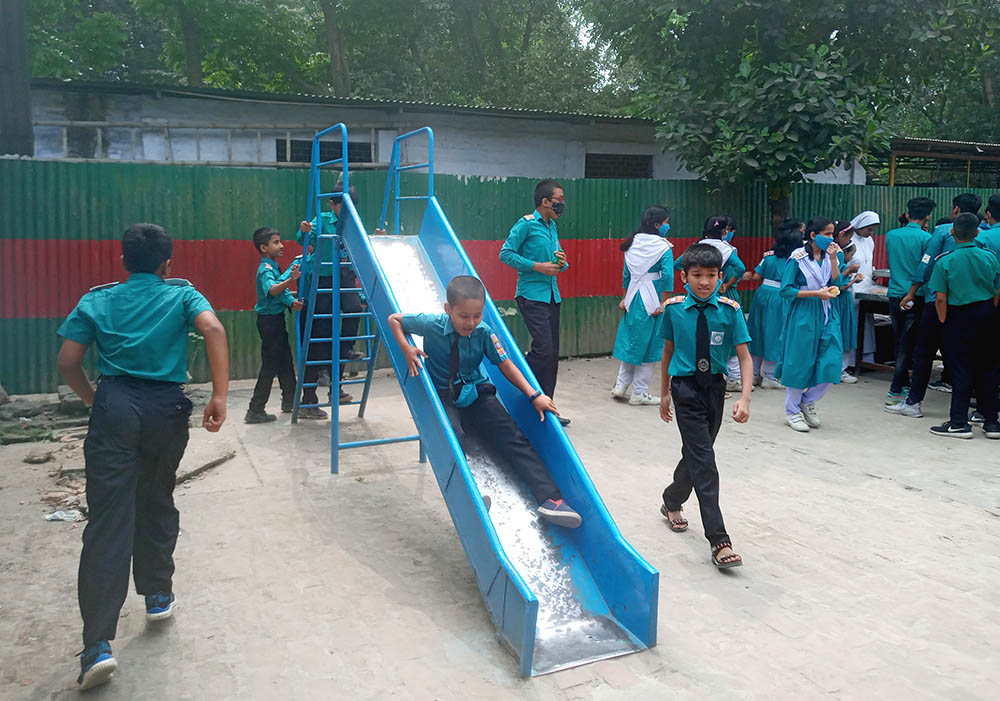
St. Francis Xavier High School students take a break during the school day. (Sumon Corraya)
"Education is power" is our school's motto. Besides academic lessons, we provide students with moral lessons. Our school has religion teachers from all faiths. Muslim teachers teach Islam to Muslim learners. Hindu teachers teach Hinduism to Hindu learners. And we nuns teach Christianity to Christian learners.
We arrange Christmas celebrations in December. We also arrange an iftar [the meal eaten by Muslims after sunset during Ramadan] party. Muslim teachers also arrange an iftar party at the school with their finances for all the non-Muslim teachers. We have religious harmony in the school among teachers.
In the Secondary School Certificate examination, 100% of students pass.
How did you get the new school building?
With our congregation's finances, we built a new school building in 2015. At that time, we invited Iqbalur Rahim as the chief guest in the program. He promised he would gift us with a new school building.
He recalled his sweet childhood memories and said, "Nuns loved me and my siblings. Sometimes, my parents couldn't come to pick us up. The nuns brought us to our home. They helped us establish the basis of our education, which helped us build our careers." Rahim's father was a minister. He was busy with his political activity.
There was an old one-story building that required repair or demolition for a new building. In 2018, Rahim called us to make a plan for a new school building [after the one-story building was demolished]. We submitted the master plan as Rahim advised to the Education Engineering Department. This is how we obtained the new school building, which was inaugurated March 14 with a colorful program.
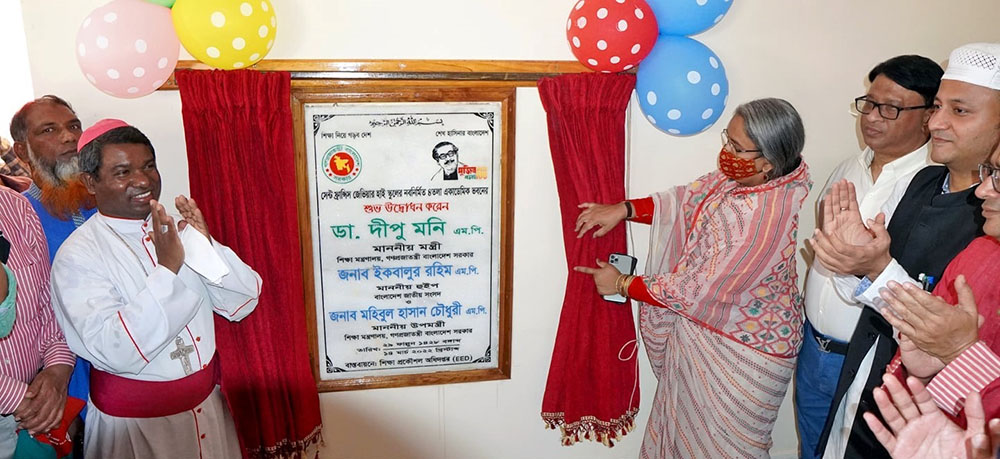
Bishop Sebastian Tudu, at left, claps as Dipu Moni, Bangladesh's education minister, shows a plaque inaugurating St. Francis Xavier High School's new building March 14 in Dinajpur, northern Bangladesh. At right next to Moni is Iqubalur Rahim, a member of Parliament and alumnus of the school. (Courtesy of Pierina Cecilia Das)
We continue to have a healthy relationship with Rahim. Whenever we need help, we go to him. We also have good relationships with the local district commissioner, education officer, and other important government officials.
How are you benefiting from this new school building?
Our old school building, which was a one-story building, didn't have sufficient space for students, and it was risky and almost unusable. After establishing the new three-story building [in March], we were able to shift many students.
In the past, we had 1,250 students, and now, we have started enrolling more students there. We can now provide an education to around 2,000 students. By getting more students, we will earn more, and we will be able to hire more teachers and other staff. Already, we have 40 teachers and 10 administrative staff.
Our school is situated in the middle of Dinajpur, where there are few Christian families. In addition to rich families' children, hundreds of lower-caste families' children also study in our school. Thanks to the school uniforms, the rich and lower castes become the same. We teach them that all human beings are equal. Those students who are needy and qualify, they can study for free. With the new building, we can do more charity work.
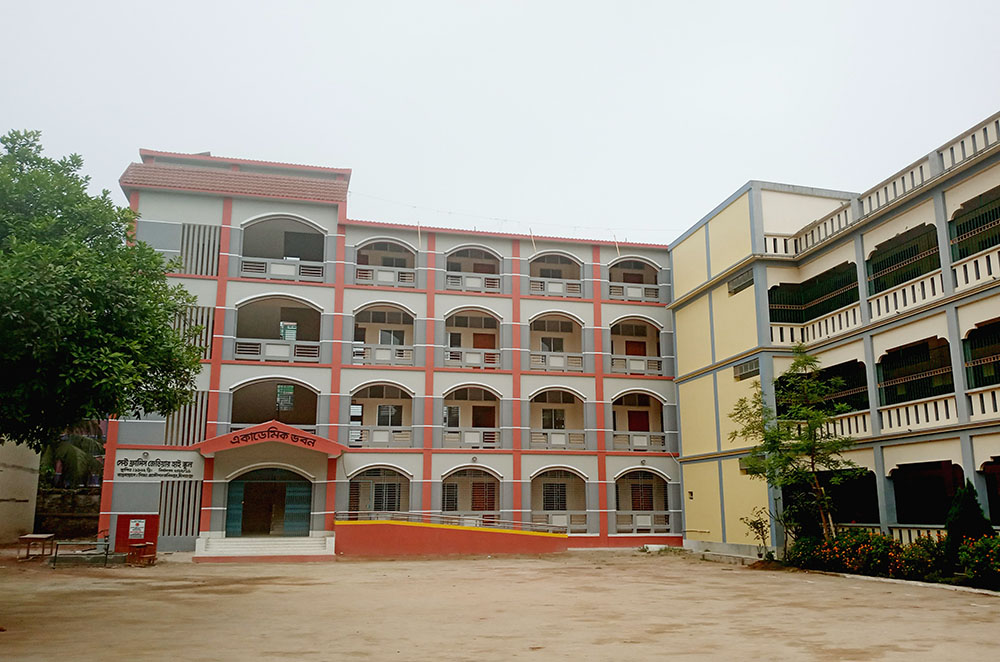
St. Francis Xavier High School's newest building, left, abuts a building that the Shanti Rani Sisters built in 2015 with their own funds. (Sumon Corraya)
What are the opinions of former and current students and their parents?
Former and present students and their parents are very happy with the education system of this school. Former students enroll their children in this combined school, where girls and boys get an education. Parents are happy with the good results for their children.
Parents say their children are better looked after, and the tuition fee is less for our school than other schools. Parents can afford their children's education.
Additionally, the parents noted that Education Minister Dr. Dipu Moni and other high-level government officials came to our school during the inauguration of the new school building. It also made them happy. They asked us to open grades 11 and 12.
What kinds of challenges do you face as the head of the school and a nun?
To lead the school, we face various kinds of barriers. In the beginning, it was challenging to get students. Now, we have a sufficient number of students, as it is an old and reputable educational institution in the city.
Advertisement
Sometimes, some parents have complaints [about the grades their children receive]. We solve them with our teachers. If we cannot solve them, we ask for help from Bishop Sebastian Tudu, who is president of the school. Former students also bring solutions for our problems.
Recently, we found some students involved with drugs. We are doing counseling instead of giving them a transfer certificate or expelling them from the school. We installed CCTV cameras in all classrooms to bring surveillance to all activity. This is how we discover if any occurrences take place with the help of technology.
Sometimes, an organization may ask for money from us illegally. Some of them see us weak, as we are Christian and nuns. I tell them to write an application for money. They don't write to ask for money, and we cannot give any money without a receipt. Former students come forward to help us. We never allow any kinds of extortion. The local commissioner is our former student, and so are other respected dignitaries in Balubari. They help us if we face problems.
In this country, 90% of people are Muslim. How do you become a witness through this school?
In this school, out of 50 teachers and staff, six of us are nuns. Personally, some parents asked me to increase the number of nuns on staff. They like the teachings of the nuns. The parents want us to stay with the children. In the play and nursery grades, we teach.
When we nuns teach, we teach with love to all students of all faiths. I have observed that nuns can patiently teach. When students commit an offense, we don't tell anything to them directly and don't get angry. We call their parents. We humbly tell them what their children did. The parents help us correct their children. Those students realize they did wrong and change their minds. Their parents are happy with this method.
I call meetings with the parents within three months and ask them what their opinions are. By this exchange of views, we can make correct decisions on school activity.
Please describe your future plans.
We want to continue our education standard, and we have a plan to further develop our teaching style. If our congregation and the president of the school want, we will extend to grades 11 and 12. We cannot preach God's message directly through this school, but want we want to preach more through our behavior and words.
Would you like to say anything else?
In Bangladesh, demand for Christian missionary schools has been huge. Muslims observe our honesty, justice and accountability. That's why they believe they gain much if they get an education from a missionary school.
Balubari is a Muslim-majority area. We here have been working as a salt of the holy Bible. We are becoming witness for Jesus Christ. As nuns, when we go to the market, Muslims greet us and give us respect. Most of them tell us they are former students or their children are current students. We get their love and support. It makes us happy.







